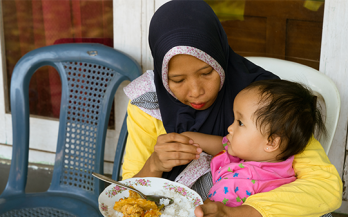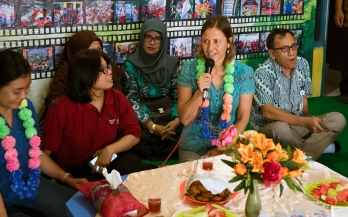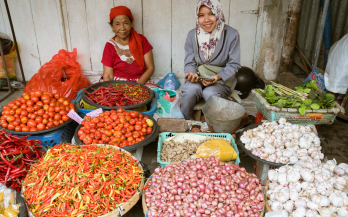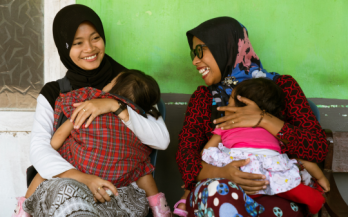- 02/10/2025
Food culture refers to a shared value system, norms, symbols, and perceptions. Yet within the food and nutrition sector, it is often reduced to traditional foods, dishes, or cuisines—a narrow view that constrains how food culture could be leveraged to shape future food preferences and habits. This working paper reviews Indonesian food culture broadly, seeking to understand and appreciate the country’s diverse cuisine. The paper draws on data from governmental reports, academic papers, media reports, social media analysis, and expert interviews.
- 16/06/2025
Indonesia’s 2025 update of its Food Security and Vulnerability Atlas (FSVA) marks a transformative leap in the nation’s
commitment to building a resilient, data-driven food system. While the FSVA has been updated annually in previous years, the 2025 edition introduces major innovations, including the use of village-level data for over 83,000 villages, expanded sub-district analysis, and the integration of new composite indicators and predictive modeling. These advances enable the more precise identification of food-insecure areas, supporting targeted actions aligned with national priorities, such as reducing stunting, alleviating poverty, and promoting rural development. With these enhancements, FSVA 2025 strengthens Indonesia’s capacity to deliver evidence-based, locally tailored
interventions across all levels of government.
- 09/06/2025
The Nutrition for Growth (N4G) Summit 2025 is set to be a defining global event, providing a vital platform for countries to reaffirm and strengthen their commitments toward ending all forms of malnutrition. This summit holds global significance as it seeks to accelerate progress toward the Sustainable Development Goals (SDGs), particularly goals related to nutrition, health, and sustainable food systems. For Indonesia, the 2025 Summit represents an opportunity to build upon and deepen its commitments from previous summits, specifically targeting persistent challenges such as stunting, wasting, obesity, and anemia, while reinforcing systemic integration of nutrition within broader health and social protection frameworks.
- 03/06/2025
The world is facing multiple interconnected crises, including climate change and escalating conflicts, which pose significant challenges to food systems. These issues highlight the need for systemic transformation to improve food security, nutrition, and environmental sustainability. In response, GAIN's Nourishing Food Pathways (NFP) programme aims to strengthen and support the implementation of food system pathways in 11 countries.
One focus of NFP is exploring the intersection between food and environment, including climate change, to identify consumer actions that promote both nutrition and environmental sustainability in low- and middle-income countries (LMICs). Specifically, GAIN is interested in understanding if our Emotivate™ approach, which leverages emotions to motivate consumers to want better diets, can be extended to include emotions or values associated with environmental sustainability. Our initial hypothesis was that consumers felt emotional tensions related to environmental sustainability as a driver of food choices, which could be leveraged to develop an emotionally resonant campaign.
- 16/05/2025
WHA Global Nutrition Stunting Target 2012-2025
Achieve a 40% reduction in the number of children under-5 who are stunted
WHA Global Nutrition Overweight Target 2012-2025
Ensure that there is no increase in childhood overweight
- 28/10/2024
Indonesia is confronting a pressing public health challenge that extends beyond diet: the impact of non- communicable diseases (NCDs) driven by lifestyle factors, including high sodium intake. This issue
is particularly concerning as many NCDs, such
as hypertension and cardiovascular disease, are preventable yet contribute significantly to the country’s morbidity and mortality rates. For instance, Indonesia’s stroke burden remains substantial, with a Disability- Adjusted Life Years (DALYs) rate of 3,809 per 100,000 people in 2021,1 one of the highest in Southeast Asia, reflecting the urgent need for targeted public health interventions.
- 27/08/2024
This brief explains some key findings and recommendations from a recent roadmap report on FLW reduction produced by the Ministry of National Development Planning (BAPPENAS), with key partnerships from the Global Alliance for Improved Nutrition (GAIN). It highlights the crucial role of coordinated efforts in achieving the desired reduction in FLW and thereby mitigating its environmental and economic impacts.
- 31/05/2024
Micronutrient malnutrition remains a significant challenge in Indonesia, particularly among impoverished populations who struggle to afford and access nutrient-rich foods. Iron deficiency anemia is especially concerning, affecting 48.9% of pregnant women and 38.5% of children across the country. To address these gaps, the Ministry of Health, in collaboration with the Global Alliance for Improved Nutrition (GAIN), conducted a comprehensive Micronutrient Gap Assessment (MGA). This assessment aimed to evaluate micronutrient intake levels among Indonesians and identify the potential benefits of rice fortification in meeting recommended dietary requirements.
- 22/04/2024
As countries develop their National Pathways for food systems transformation, one emerging need is to
ensure policies land at different levels. A truly effective ‘national’ policy must span all sub-national areas.
- 16/09/2022
In 2013 Indonesia’s Ministry of Health requested that GAIN support the district governments of Malang and Sidoarjo in East Java Province to reduce stunting by improving maternal and infant nutrition.









